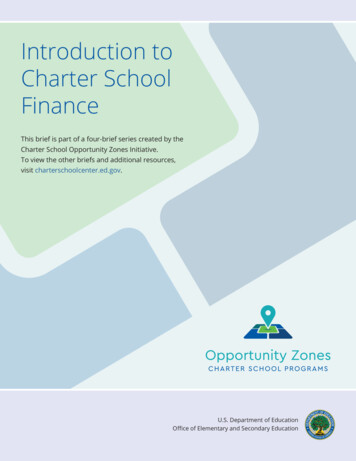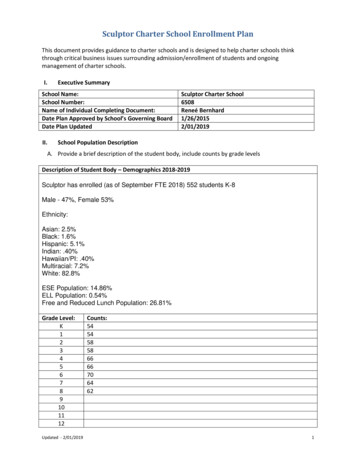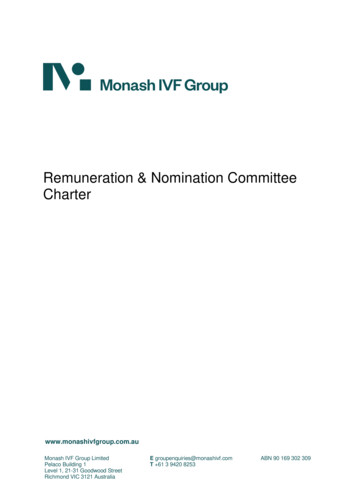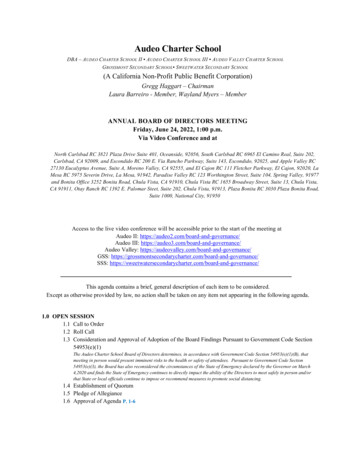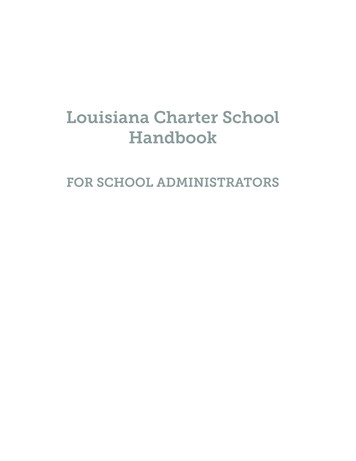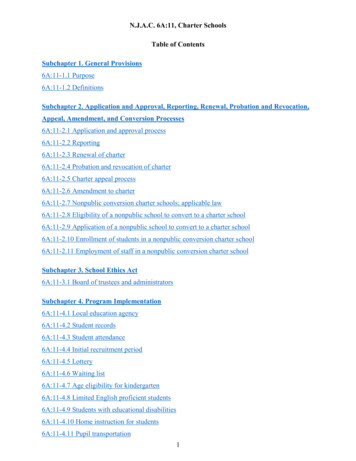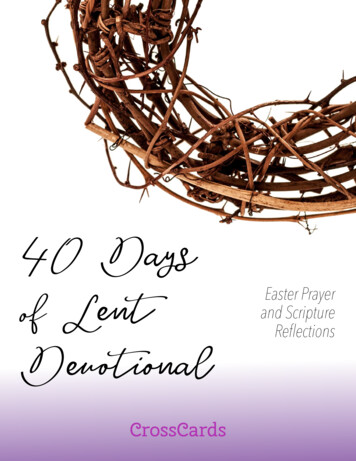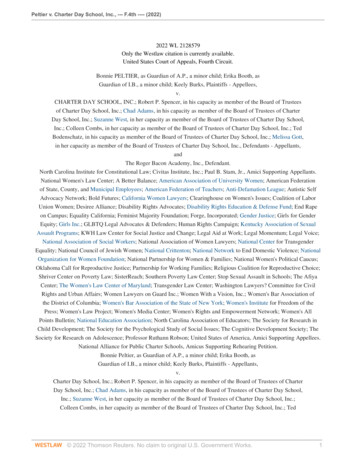
Transcription
Peltier v. Charter Day School, Inc., --- F.4th ---- (2022)2022 WL 2128579Only the Westlaw citation is currently available.United States Court of Appeals, Fourth Circuit.Bonnie PELTIER, as Guardian of A.P., a minor child; Erika Booth, asGuardian of I.B., a minor child; Keely Burks, Plaintiffs - Appellees,v.CHARTER DAY SCHOOL, INC.; Robert P. Spencer, in his capacity as member of the Board of Trusteesof Charter Day School, Inc.; Chad Adams, in his capacity as member of the Board of Trustees of CharterDay School, Inc.; Suzanne West, in her capacity as member of the Board of Trustees of Charter Day School,Inc.; Colleen Combs, in her capacity as member of the Board of Trustees of Charter Day School, Inc.; TedBodenschatz, in his capacity as member of the Board of Trustees of Charter Day School, Inc.; Melissa Gott,in her capacity as member of the Board of Trustees of Charter Day School, Inc., Defendants - Appellants,andThe Roger Bacon Academy, Inc., Defendant.North Carolina Institute for Constitutional Law; Civitas Institute, Inc.; Paul B. Stam, Jr., Amici Supporting Appellants.National Women's Law Center; A Better Balance; American Association of University Women; American Federationof State, County, and Municipal Employees; American Federation of Teachers; Anti-Defamation League; Autistic SelfAdvocacy Network; Bold Futures; California Women Lawyers; Clearinghouse on Women's Issues; Coalition of LaborUnion Women; Desiree Alliance; Disability Rights Advocates; Disability Rights Education & Defense Fund; End Rapeon Campus; Equality California; Feminist Majority Foundation; Forge, Incorporated; Gender Justice; Girls for GenderEquity; Girls Inc.; GLBTQ Legal Advocates & Defenders; Human Rights Campaign; Kentucky Association of SexualAssault Programs; KWH Law Center for Social Justice and Change; Legal Aid at Work; Legal Momentum; Legal Voice;National Association of Social Workers; National Association of Women Lawyers; National Center for TransgenderEquality; National Council of Jewish Women; National Crittenton; National Network to End Domestic Violence; NationalOrganization for Women Foundation; National Partnership for Women & Families; National Women's Political Caucus;Oklahoma Call for Reproductive Justice; Partnership for Working Families; Religious Coalition for Reproductive Choice;Shriver Center on Poverty Law; SisterReach; Southern Poverty Law Center; Stop Sexual Assault in Schools; The AfiyaCenter; The Women's Law Center of Maryland; Transgender Law Center; Washington Lawyers? Committee for CivilRights and Urban Affairs; Women Lawyers on Guard Inc.; Women With a Vision, Inc.; Women's Bar Association ofthe District of Columbia; Women's Bar Association of the State of New York; Women's Institute for Freedom of thePress; Women's Law Project; Women's Media Center; Women's Rights and Empowerment Network; Women's AllPoints Bulletin; National Education Association; North Carolina Association of Educators; The Society for Research inChild Development; The Society for the Psychological Study of Social Issues; The Cognitive Development Society; TheSociety for Research on Adolescence; Professor Ruthann Robson; United States of America, Amici Supporting Appellees.National Alliance for Public Charter Schools, Amicus Supporting Rehearing Petition.Bonnie Peltier, as Guardian of A.P., a minor child; Erika Booth, asGuardian of I.B., a minor child; Keely Burks, Plaintiffs - Appellants,v.Charter Day School, Inc.; Robert P. Spencer, in his capacity as member of the Board of Trustees of CharterDay School, Inc.; Chad Adams, in his capacity as member of the Board of Trustees of Charter Day School,Inc.; Suzanne West, in her capacity as member of the Board of Trustees of Charter Day School, Inc.;Colleen Combs, in her capacity as member of the Board of Trustees of Charter Day School, Inc.; Ted 2022 Thomson Reuters. No claim to original U.S. Government Works.1
Peltier v. Charter Day School, Inc., --- F.4th ---- (2022)Bodenschatz, in his capacity as member of the Board of Trustees of Charter Day School, Inc.; Melissa Gott,in her capacity as member of the Board of Trustees of Charter Day School, Inc., Defendants - Appellees,andThe Roger Bacon Academy, Inc., Defendant.National Women's Law Center; A Better Balance; American Association of University Women; American Federationof State, County, and Municipal Employees; American Federation of Teachers; Anti-Defamation League; Autistic SelfAdvocacy Network; Bold Futures; California Women Lawyers; Clearinghouse on Women's Issues; Coalition of LaborUnion Women; Desiree Alliance; Disability Rights Advocates; Disability Rights Education & Defense Fund; End Rapeon Campus; Equality California; Feminist Majority Foundation; Forge, Incorporated; Gender Justice; Girls for GenderEquity; Girls Inc.; GLBTQ Legal Advocates & Defenders; Human Rights Campaign; Kentucky Association of SexualAssault Programs; KWH Law Center for Social Justice and Change; Legal Aid at Work; Legal Momentum; Legal Voice;National Association of Social Workers; National Association of Women Lawyers; National Center for TransgenderEquality; National Council of Jewish Women; National Crittenton; National Network to End Domestic Violence; NationalOrganization for Women Foundation; National Partnership for Women & Families; National Women's Political Caucus;Oklahoma Call for Reproductive Justice; Partnership for Working Families; Religious Coalition for Reproductive Choice;Shriver Center on Poverty Law; SisterReach; Southern Poverty Law Center; Stop Sexual Assault in Schools; The AfiyaCenter; The Women's Law Center of Maryland; Transgender Law Center; Washington Lawyers' Committee for CivilRights and Urban Affairs; Women Lawyers on Guard Inc.; Women With a Vision, Inc.; Women's Bar Association ofthe District of Columbia; Women's Bar Association of the State of New York; Women's Institute for Freedom of thePress; Women's Law Project; Women's Media Center; Women's Rights and Empowerment Network; Women's All PointsBulletin; National Education Association; North Carolina Association of Educators; The Society for Research in ChildDevelopment; The Society for the Psychological Study of Social Issues; The Cognitive Development Society; The Societyfor Research on Adolescence; Professor Ruthann Robson; United States of America, Amici Supporting Appellants.North Carolina Institute for Constitutional Law; Civitas Institute, Inc.; Paul B. Stam, Jr., Amici Supporting Appellees.No. 20-1001, No. 20-1023 Argued: December 10, 2021 Decided: June 14, 2022Appeals from the United States District Court for the Eastern District of North Carolina, at Wilmington. Malcolm J. Howard,Senior District Judge. (7:16 cv 00030 H KS)Attorneys and Law FirmsARGUED: Aaron Michael Streett, BAKER BOTTS L.L.P., Houston, Texas, for Appellants/Cross-Appellees. Galen LeighSherwin, AMERICAN CIVIL LIBERTIES UNION FOUNDATION, New York, New York, for Appellees/Cross-Appellants.ON BRIEF: J. Mark Little, Travis L. Gray, BAKER BOTTS L.L.P., Houston, Texas, for Appellants/Cross-Appellees.Ria Tabacco Mar, Jennesa Calvo-Friedman, Louise Melling, Amy Lynn Katz, AMERICAN CIVIL LIBERTIES UNIONFOUNDATION, New York, New York; Irena Como, ACLU OF NORTH CAROLINA LEGAL FOUNDATION, Raleigh, NorthCarolina; Jonathan D. Sasser, ELLIS & WINTERS LLP, Raleigh, North Carolina, for Appellees/Cross-Appellants. JeanetteK. Doran, NORTH CAROLINA INSTITUTE FOR CONSTITUTIONAL LAW, Raleigh, North Carolina, for Amicus NorthCarolina Institute for Constitutional Law. Paul B. Stam, Jr., R. Daniel Gibson, STAM LAW FIRM, PLLC, Apex, North Carolina,for Amici The Civitas Institute, Inc. and Paul B. Stam, Jr. Brian R. Matsui, Aaron D. Rauh, MORRISON & FOERSTER LLP,Washington, D.C., for Amici Society for Research in Child Development, Society for the Psychological Study of Social Issues,Cognitive Development Society, and Society for Research on Adolescence. Alice O'Brien, Eric A. Harrington, Rebecca Yates,NATIONAL EDUCATION ASSOCIATION, Washington, D.C.; Verlyn Chesson-Porte, NORTH CAROLINA ASSOCIATION 2022 Thomson Reuters. No claim to original U.S. Government Works.2
Peltier v. Charter Day School, Inc., --- F.4th ---- (2022)OF EDUCATORS, Raleigh, North Carolina, for Amici The National Education Association and North Carolina Association ofEducators. Emily Martin, Neena Chaudhry, Sunu Chandy, Adaku Onyeka-Crawford, NATIONAL WOMEN'S LAW CENTER,Washington, D.C.; Courtney M. Dankworth, DEBEVOISE & PLIMPTON LLP, New York, New York, for Amici NationalWomen's Law Center and Coalition of Civil Rights and Public Interest Organizations. Jayme Jonat, Nina Kanovitch Schiffer,HOLWELL SHUSTER & GOLDBERG LLP, New York, New York, for Amicus Professor Ruthann Robson. Kristen Clarke,Assistant Attorney General, Thomas E. Chandler, Jason Lee, Appellate Section, Civil Rights Division, UNITED STATESDEPARTMENT OF JUSTICE, Washington, D.C., for Amicus United States. Christopher A. Brook, PATTERSON HARKAVYLLP, Chapel Hill, North Carolina, for Amicus National Alliance for Public Charter Schools.Before GREGORY, Chief Judge, and WILKINSON, NIEMEYER, MOTZ, KING, AGEE, WYNN, DIAZ, THACKER,HARRIS, RICHARDSON, QUATTLEBAUM, RUSHING, and HEYTENS, Circuit Judges, and KEENAN and FLOYD, SeniorCircuit Judges.Affirmed in part, vacated in part, and remanded by published opinion. Senior Judge Keenan wrote the opinion, in which ChiefJudge Gregory and Judges Motz, King, Wynn, Diaz, Thacker, Harris, Heytens, and Senior Judge Floyd joined. Judge Wynnwrote a concurring opinion, in which Judges Motz, Thacker, Harris, and Senior Judge Keenan joined. Senior Judge Keenan wrotea concurring opinion, in which Judge Thacker joined. Judge Quattlebaum wrote an opinion dissenting in part and concurring inpart, in which Judges Richardson and Rushing joined, and in which Judges Wilkinson, Niemeyer, and Agee joined dissentingin part. Judge Wilkinson wrote a dissenting opinion, in which Judges Niemeyer and Agee joined.ON REHEARING EN BANCBARBARA MILANO KEENAN, Senior Circuit Judge:Charter Day School (CDS), 1 a public charter school in North Carolina, requires female students to wear skirts to school basedon the view that girls are “fragile vessels” deserving of “gentle” treatment by boys (the skirts requirement). The plaintiffsargue that this sex-based classification grounded on gender stereotypes violates the Equal Protection Clause of the FourteenthAmendment, and subjects them to discrimination and denial of the full benefits of their education in violation of Title IX of theEducation Amendments of 1972, 20 U.S.C. § 1681 et seq. (Title IX).In response, despite CDS' status as a public school under North Carolina law, CDS and its management company disavowaccountability under the Equal Protection Clause by maintaining that they are not state actors. These entities also assert thatTitle IX, the federal statute designed to root out gender discrimination in schools, categorially does not apply to dress codes.Upon our review, we affirm the district court's entry of summary judgment for the plaintiffs on their Equal Protection claimagainst CDS, and the court's judgment in favor of the management company on that claim. We also vacate the court's summaryjudgment award in favor of all defendants on the plaintiffs' Title IX claim and remand for further proceedings on that claim.I.CDS, a public charter school in Brunswick County, North Carolina, educates male and female 2 students in kindergarten throughthe eighth grade. The founder of the school, Baker A. Mitchell, Jr., incorporated defendant Charter Day School, Inc. in 1999.The following year, he obtained a charter from the state of North Carolina, pursuant to the North Carolina Charter Schools Actof 1996, N.C. Gen. Stat. § 115C-218 et seq. CDS' policies are established by the volunteer members of its Board of Trustees(the Board). Mitchell initially served as the Board's chairman and now serves as its non-voting secretary. 2022 Thomson Reuters. No claim to original U.S. Government Works.3
Peltier v. Charter Day School, Inc., --- F.4th ---- (2022)*2 Enrollment at CDS is open to all students who are eligible to attend North Carolina public schools. See N.C. Gen. Stat. §115C-218.45(a). CDS receives 95% of its funding from federal, state, and local governmental authorities.After applying for its charter, CDS entered into a “charter school management contract” (the management agreement) withdefendant Roger Bacon Academy, Inc. (RBA), a for-profit corporation founded and owned by Mitchell. Under the terms ofthe management agreement, RBA is responsible for the day-to-day operations of CDS, including hiring school personnel andcarrying out the school's education program. CDS maintains a bank account on which RBA is a signatory and from which RBAreceives reimbursements for fees and operational expenses.Since its inception, CDS, at the direction of Mitchell and the Board, has “emphasize[d] traditional values,” including a“traditional curriculum, traditional manners and traditional respect.” These stated priorities pervade many areas of the school'spractices. For example, CDS teaches a “classical curriculum,” utilizing a “direct instruction” method. Overall, as one Boardmember explained, CDS operates “more like schools were 50 years ago compared to now.”As part of this educational philosophy, CDS has implemented a dress code to “instill discipline and keep order” among students.Among other requirements, all students must wear a unisex polo shirt and closed-toe shoes; “[e]xcessive or radical haircuts andcolors” are prohibited; and boys are forbidden from wearing jewelry. Female students are required to wear a “skirt,” “jumper,”or “skort.” In contrast, boys must wear shorts or pants. All students are required to comply with the dress code unless theyhave physical education class, when they wear unisex physical education uniforms, or an exception is made for a field trip orother special event. A student's failure to comply with the dress code requirements may result in disciplinary action, includingnotification of the student's parent, removal from class to comply with the dress code, or expulsion, though no student has beenexpelled for violating the dress code.In 2015, plaintiff Bonnie Peltier, the mother of a female kindergarten student at CDS, informed Mitchell that she objected tothe skirts requirement. Mitchell responded to Peltier in support of the policy, stating:The Trustees, parents, and other community supporters were determined to preserve chivalry and respectamong young women and men in this school of choice. For example, young men were to hold the dooropen for the young ladies and to carry an umbrella, should it be needed. Ma'am and sir were to be thepreferred forms of address. There was felt to be a need to restore, and then preserve, traditional regardfor peers.Mitchell later elaborated that chivalry is “a code of conduct where women are treated, they're regarded as a fragile vessel thatmen are supposed to take care of and honor.” Mitchell further explained that, in implementing the skirts requirement, CDSsought to “treat[ ] [girls] courteously and more gently than boys.”Peltier and two other CDS parents and guardians, on behalf of their female children (the plaintiffs), filed suit in the EasternDistrict of North Carolina against CDS, the members of the Board, and RBA (the defendants), alleging violations of the EqualProtection Clause and Title IX. 3 The plaintiffs alleged that the skirts requirement is a sex-based classification rooted in genderstereotypes that discriminates against them based on their gender. The parties later filed cross-motions for summary judgment.*3 In support of their summary judgment motion, the plaintiffs submitted evidence of the tangible and intangible harms theysuffer based on the skirts requirement. One plaintiff testified that the skirts requirement conveys the school's view that girls“simply weren't worth as much as boys,” and that “girls are not in fact equal to boys.” Another plaintiff stated that the skirtsrequirement “sends the message that girls should be less active than boys and that they are more delicate than boys,” with theresult that boys “feel empowered” and “in a position of power over girls.” 2022 Thomson Reuters. No claim to original U.S. Government Works.4
Peltier v. Charter Day School, Inc., --- F.4th ---- (2022)The plaintiffs also described the impact of the skirts requirement on their ability to participate in school activities. On oneoccasion, when a first-grade female student wore shorts to school due to a misunderstanding of the dress code, she was removedfrom class and was required to spend the day in the school's office. The plaintiffs also explained that they avoid numerousphysical activities, including climbing, using the swings, and playing soccer, except for days on which they are permitted towear their unisex physical education uniforms. The plaintiffs further testified that they cannot participate comfortably in schoolemergency drills that require students to crawl and kneel on the floor, fearing that boys will tease them or look up their skirts.Both parties presented evidence from expert witnesses regarding the effects that the skirts requirement and gender stereotypeshave on female students.The district court concluded that CDS, in imposing and implementing the skirts requirement, was a state actor for purposes ofthe Equal Protection claim brought under 42 U.S.C. § 1983. The court reasoned that CDS' provision of a free, public educationis a function historically and exclusively performed by the state and that, therefore, CDS' conduct fairly is attributable to thestate of North Carolina. However, with respect to RBA, the court concluded that RBA does not have a sufficiently close tie tothe state to qualify as a state actor. On the merits of the Equal Protection claim, the court held that the skirts requirement violatesthe Equal Protection Clause. The court therefore granted summary judgment to the plaintiffs on this claim against CDS.The district court reached a different conclusion regarding the Title IX claim, holding that dress codes categorically are exemptfrom Title IX's prohibition against gender discrimination. The court reasoned that when the United States Department ofEducation rescinded a prior regulation governing dress codes, the Department reasonably had concluded that Congress did notintend for such policies to be subject to Title IX. The court thus granted summary judgment to the defendants on the Title IXclaim. The district court denied summary judgment without prejudice on the plaintiffs' state law claims and entered partial finaljudgment on the remainder of the case.On appeal, a panel of this Court reversed the district court's judgment on both the Equal Protection and the Title IX claims.Peltier v. Charter Day Sch., Inc., 8 F.4th 251, 257 (4th Cir. 2021), reh'g en banc granted, 2021 WL 4892153 (4th Cir. 2021).That decision was vacated by a vote of the full Court, and we now consider this appeal en banc.II.We review de novo the district court's summary judgment decision. Jessup v. Barnes Grp., Inc., 23 F.4th 360, 365 (4th Cir.2022). Summary judgment may be granted only if “the movant shows that there is no genuine dispute as to any material factand the movant is entitled to judgment as a matter of law.” Id. (quoting Fed. R. Civ. P. 56(a)).A.EQUAL PROTECTION CLAIM*4 We begin with the plaintiffs' Equal Protection claim. To prevail on this claim under Section 1983, the plaintiffs were requiredto show that: (1) the defendants deprived them of a constitutional right; and (2) the defendants did so “under color of [State]statute, ordinance, regulation, custom, or usage” (the state action requirement). 4 Mentavlos v. Anderson, 249 F.3d 301, 310(4th Cir. 2001) (alteration in original) (citation omitted). The state action requirement of Section 1983 “excludes from its reachmerely private conduct, no matter how discriminatory or wrongful.” Id. (citation and internal quotation marks omitted).i. 2022 Thomson Reuters. No claim to original U.S. Government Works.5
Peltier v. Charter Day School, Inc., --- F.4th ---- (2022)State Action AnalysisIn assessing a private actor's relationship with the state for purposes of an Equal Protection claim, we must determine whetherthere is a “sufficiently close nexus” between the defendant's challenged action and the state so that the challenged action “maybe fairly treated as that of the State itself.” Id. at 314 (citation and internal quotation marks omitted). “What is fairly attributableis a matter of normative judgment, and the criteria lack rigid simplicity. [N]o one fact can function as a necessary conditionacross the board for finding state action.” Brentwood Acad. v. Tenn. Secondary Sch. Athletic Ass'n, 531 U.S. 288, 295 (2001).The Supreme Court has identified various circumstances in which a private actor may be found to have engaged in state action.The Court has held that when the state has coerced, or has provided “significant encouragement” to, a private actor, or if there is“pervasive entwinement of public institutions and public officials” with a private entity, that entity's conduct is considered stateaction. Blum v. Yaretsky, 457 U.S. 991, 1004 (1982); Brentwood, 531 U.S. at 298. Accordingly, a state's exercise of coercivepower or compulsion is not a requirement for a finding of state action under Section 1983. Brentwood, 531 U.S. at 295.A state also will be held responsible for a private actor's decision when the state's engagement or encouragement is so significantthat “the choice must in law be deemed to be that of the State.” Rendell-Baker v. Kohn, 457 U.S. 830, 842 (1982). Both theSupreme Court and this Court have recognized the presence of such engagement or encouragement when a state has outsourcedor otherwise delegated certain of its duties to a private entity, thereby rendering the acts performed under those delegatedobligations “under color of law.” Goldstein v. Chestnut Ridge Volunteer Fire Co., 218 F.3d 337, 342 (4th Cir. 2000); ManhattanCmty. Access Corp. v. Halleck, 139 S. Ct. 1921, 1929 n.1 (2019) (“[A] private entity may, under certain circumstances, bedeemed a state actor when the government has outsourced one of its constitutional obligations to [that] private entity.”); West v.Atkins, 487 U.S. 42, 56 (1988) (holding that a state's delegation of its duty to provide medical care to prisoners rendered a contractphysician a state actor). When the function at issue has been “traditionally the exclusive prerogative” of the state, a privateentity executing that function has engaged in state action. Rendell-Baker, 457 U.S. at 842 (citation omitted); see Goldstein,218 F.3d at 349 (holding that volunteer fire company in Maryland was state actor because it performed essential governmentalfunction traditionally and exclusively reserved to the state, received significant funding from state, was subject to extensivestate regulation, and was deemed by state to be state actor); see also Manhattan Cmty. Access Corp., 139 S. Ct. at 1928-29.*5 The common foundation underlying these various and sometimes overlapping circumstances is that (1) there is no brightline rule separating state action from private action, and that (2) the inquiry is highly fact-specific in nature. In other words,the state action analysis “lack[s] rigid simplicity” and, thus, a “range of circumstances” can support a finding of state action.Brentwood, 531 U.S. at 295, 303 (noting that “no one criterion must necessarily be applied” to establish state action); Goldstein,218 F.3d at 343 (holding that no single factor standing alone establishes state action). We therefore consider the totality of thecircumstances of the relationship between the private actor and the state to determine whether the action in question fairly isattributable to the state. Goldstein, 218 F.3d at 343.ii.State Action Analysis—CDSIn the present case, because the state of North Carolina was not involved in CDS' decision to implement the skirts requirement,there was no “coercion” or “pervasive entwinement” by the state with the challenged conduct. Blum, 457 U.S. at 1004;Brentwood, 531 U.S. at 298. The plaintiffs argue, however, that CDS nevertheless qualifies as a state actor on a separate permittedbasis, namely, that the operation of schools designated as “public” under North Carolina law is an exclusively public functionthat North Carolina, by statute, has delegated in part to charter school operators to fulfill the state's constitutional duty to providefree, universal elementary and secondary schooling. See Rendell-Baker, 457 U.S. at 842; West, 487 U.S. at 56. 2022 Thomson Reuters. No claim to original U.S. Government Works.6
Peltier v. Charter Day School, Inc., --- F.4th ---- (2022)In response, CDS contends that like the private school at issue in Rendell-Baker, 457 U.S. 830, operators of North Carolinacharter schools merely are private entities fulfilling contracts with the state. According to CDS, because no North Carolinastudent is required to attend CDS, the state has not delegated to charter schools its responsibility to educate North Carolinastudents. CDS also relies on the fact that the Supreme Court never has held that the provision of elementary and secondaryeducation is exclusively a state function. Thus, CDS asks us to conclude that it merely is a private actor providing a serviceunder its charter contract with the state. We disagree with CDS' argument.The North Carolina Constitution mandates that the state “provide by taxation and otherwise for a general and uniform system offree public schools . wherein equal opportunities shall be provided for all students.” N.C. Const. art. IX, § 2, cl. 1. To fulfill thisduty, in addition to establishing traditional public schools, the North Carolina legislature has authorized the creation of publiccharter schools that are overseen by a state board. N.C. Gen. Stat. § 115C-218; see also N.C. Const. art. IX, § 5 (“The StateBoard of Education shall supervise and administer the free public school system.”). Charter schools may only operate under theauthority granted to them by their charters with the state. See Id. §§ 115C-218.15(c), 115C-218.5.Among other requirements, charter schools must design their educational programming to satisfy student performance standardsadopted by the state board of education, a requirement not applicable to non-public schools. Id. §§ 115C-218.85(a)(2), 115C-547through -562. The state may revoke a school's charter, among other reasons, for non-compliance with the terms of the charter,poor student performance, or poor fiscal management. See id. § 115C-218.95. Enrollment at charter schools is open to anystudent eligible to attend a public school in North Carolina. Id. § 115C-218.45.In defining the nature of charter schools, North Carolina law expressly provides:A charter school that is approved by the State shall be a public school within the local schooladministrative unit in which it is located. All charter schools shall be accountable to the State Board forensuring compliance with applicable laws and the provisions of their charters.*6 Id. § 115C-218.15(a) 5 (emphasis added); see also id. § 115C-218(c) (North Carolina Office of Charter Schools locatedwithin the Department of Public Instruction); Sugar Creek Charter Sch., Inc. v. North Carolina, 712 S.E.2d 730, 742 (N.C. Ct.App. 2011) (observing that charter schools are “indisputably public schools”); Francine Delany New Sch. for Children, Inc. v.Asheville City Bd. of Educ., 563 S.E.2d 92, 97-98 (N.C. Ct. App. 2002) (holding that charter schools are subject to same statebudget format as traditional public schools, because the legislature “clearly expressed its intent” that charter schools “be treatedas public schools”). And “for purposes of providing certain State-funded employee benefits,” the North Carolina legislaturehas specified that “charter schools are public schools and that the employees of charter schools are public school employees.”N.C. Gen. Stat. § 115C-218.90(a)(4) (emphasis added). Thus, under the plain language of these statutes, as a matter of statelaw, charter schools in North Carolina are public institutions. 6Consistent with this “public” designation, charter schools in North Carolina receive a per-pupil funding allotment from the stateboard of education based on the amount provided for students attending traditional public schools. Id. § 115C-218.105(a). Thelocal school administrative unit where each student resides similarly transfers the student's share of local funding to the charterschool that the student attends. Id. § 115C-218.105(c). As a result of these and other public funding mechanisms, CDS receives95% of its funding directly from public sources. 7 Such substantial public funding, while not determinative, is a factor that weweigh in determining state action. Goldstein, 218 F.3d at 347.The statutory framework of the North Carolina charter school system compels the conclusion that the state has delegated tocharter school operators like CDS part of the state's constitutional duty to provide free, universal elementary and secondary 2022 Thomson Reuters. No claim to original U.S. Government Works.7
Peltier v. Charter Day School, Inc., --- F.4th ---- (2022)education. 8 See id., 218 F.3d at 342; see also Manhattan Cmty. Access Corp., 139 S. Ct. at 1929 n.1 (citing West, 487 U.S.at 56); N.C. Const. art. IX, § 2, cl. 1; N.C. Gen. Stat. § 115C-1. The state bears “an affirmative obligation” under the stateconstitution to educate North Carolina's students and partially has “delegated that function” to charter school operators, whohave carried out the state's obligation by virtue of their charters with the state. West, 487 U.S. at 56; see also Brent v. Wayne Cnty.Dep't of Hum. Servs., 901 F.3d 656, 676-77 (6th Cir. 2018) (holding that private foster care agencies were state actors because“Michigan i
Center; The Women's Law Center of Maryland; Transgender Law Center; Washington Lawyers' Committee for Civil Rights and Urban Affairs; Women Lawyers on Guard Inc.; Women With a Vision, Inc.; Women's Bar Association of the District of Columbia; Women's Bar Association of the State of New York; Women's Institute for Freedom of the

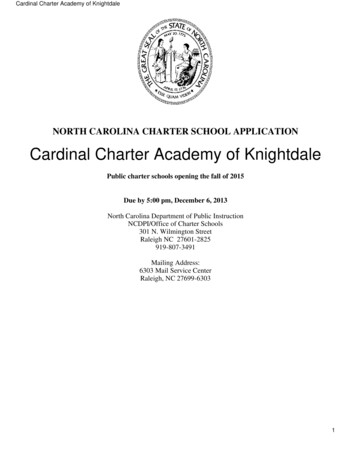
![Welcome [dashdiet.me]](/img/17/30-day-weight-loss-journal.jpg)
